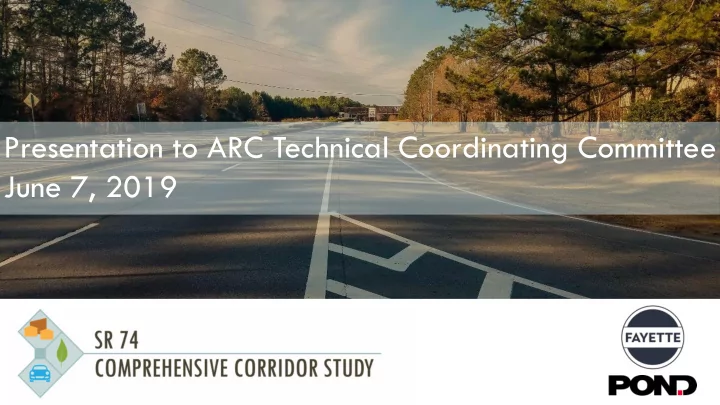

Presentation to ARC Technical Coordinating Committee June 7, 2019
• Fayette County 2016 Population: 109,495 • Major Municipalities • Peachtree City • Fayetteville • Tyrone • No Interstate • ¼ million vehicles passing into and out of County each day, nearly 50% on or indirectly associated with SR 74 • County land use: 1-acre minimum lots in north transitioning to 5-acre in south. No sewer in unincorporated County.
Study Background Desire for Consistent Formation of SR Partnership with Corridor Approach 74 Coalition GDOT and ARC
Study Purpose Establish a unified vision for the corridor Understand long term transportation needs NORTH Address congestion and future growth needs Provide capacity to maintain corridor mobility
Process & Schedule Summer Summer Winter Fall 2017 Spring 2018 2017 2018 2018 Existing Conditions Needs Assessment Evaluation Recommendations • • • Develop overall vision for corridor Confirm vision Develop alternatives • Determine solutions • • • Field inventory and data collection Understand future Address existing needs • Prioritize initiatives • Review legacy planning • Anticipate needs • Address future needs • Document
Recommendations Transit & Travel Bicycle & Vehicle Framework for Demand Pedestrian Improvements Consistency Management Improvements Superstreet Concept Multi-Use Path Common Elements Park & Ride Lot • RCUTs • • Grade Separations • Signage Route Extensions • J-Turns • • Enhanced Crossings • Access Management Carpool and Vanpool • MUTs • • Alignment Options Parking Policies
Keys to Success Community & Stakeholder Engagement Strong Technical Analysis Communication Through Imagery and Plan Document
1. Engagement SR 74 Coalition/Stakeholder Group • Early Listening Session to gather ideas • Visioning Process • Ideas and Recommendations Vetting
1. Engagement Surveys & Meetings • 4 Community Meetings • Online survey • Tactical Engagement Stakeholder Community Suggested Area ID Group Meetings Total Direction Emphasis Yes! No! Yes! No! Yes! No! 1 Access 6 5 28 32 34 37 52%Mobility 2 Mobility 7 3 31 16 38 19 67%Mobility 3 Access 4 5 31 24 35 29 55%Access 4 Mobility 6 4 30 11 36 15 71%Mobility 5 Access 6 3 19 22 25 25 50%Mix 6 Mobility 9 3 37 5 46 8 85%Mobility 7 Access 6 4 24 24 30 28 52%Mobility
Partnership Engagement 1. Engagement Develop Scenarios & Establish Existing Conditions & Finalize Recommendations Project Ideas Needs Assessment Briefing to City and Town Briefing to City and Town Briefing to GDOT Councils (October 2018) Councils (March 2018) (December 2017) Workshop with GDOT District 3 (May 2018)
2. Technical Analysis Establishment and understanding of baseline data
2. Technical Analysis High Growth Scenario Medium Growth Scenario Low Growth Scenario 5% Annual Growth Rate 1.4% Annual Growth Rate 1.0% Annual Growth Rate Based on travel demand model Based on travel demand model Compounded extrapolation projected change in volume. projected growth rate. 120,000 of trends since 1990. Thorough 100,000 understanding 10 lanes may 80,000 be needed * 8 lanes may of possible 60,000 be needed * 40,000 6 lanes may be needed * futures 20,000 - 1990 2000 2010 2016 2020 2030 2040 Actual Historical Data Possible Future Scenarios *Various operational improvements at bottleneck locations and intersections can help reduce the number of lanes needed.
2. Technical Analysis Early adoption of GDOT ICE process
2. Technical Analysis Comprehensive examination of benefits 2040 AM Peak 2040 AM Peak 2040 PM Peak 2040 PM Peak Network Totals No-Build Build Percent Change No-Build Build Percent Change Total Delay (hr) 4,113 814 -80% 10,164 2,863 -72% Number of 65,712 46,840 -29% 173,709 99,748 -43% Stops (#) Average Speed 8.0 19.0 +11.0 5.0 13.0 +8.0 (mph) Total Travel 5,586 2,309 -59% 12,261 4,992 -59% Time (hr) Distance 44,201 44,847 +1% 62,917 63,830 +1% Traveled (mi) - - - - - - - - - - - - d
3. Communication
3. Communication
3. Communication
Questions?
Recommend
More recommend